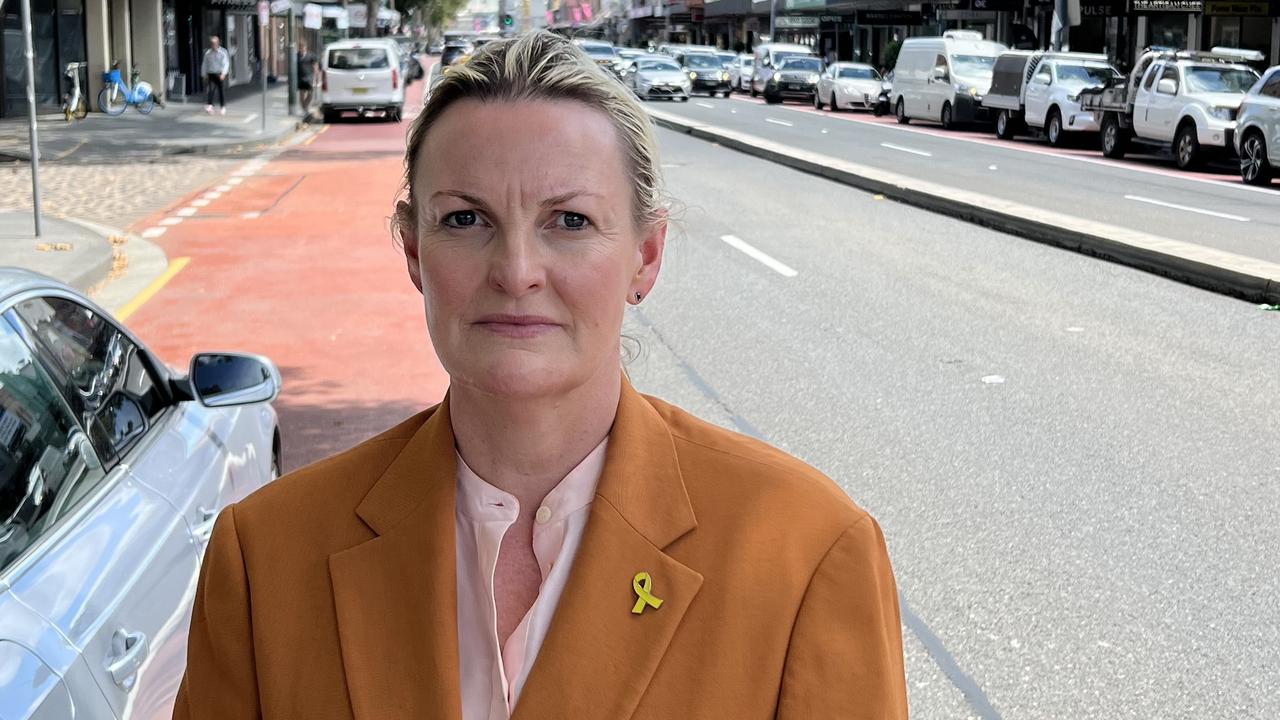Paying extra for luxury private service in a post-lockdown world
Lockdown is over but it looks like social distancing is here to stay and it’s changing the way many small businesses operate.
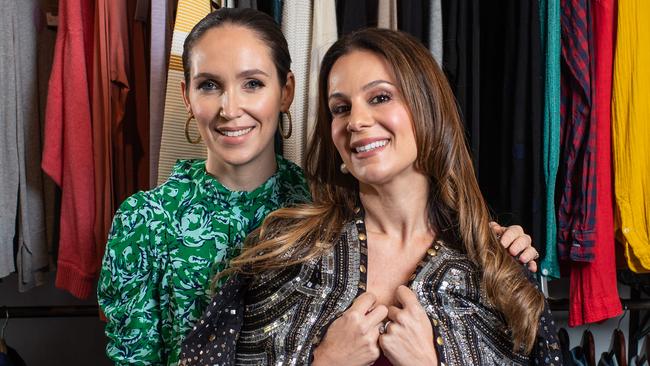
Wentworth Courier
Don't miss out on the headlines from Wentworth Courier. Followed categories will be added to My News.
When George Giavis opened his Woollahra salon in 1995, he had no idea he was ahead of his time. He created one of the first Covid-safe businesses.
As a colour-specialist salon, he wanted to provide his clients with privacy during long-haul hair colour services, which is why everyone gets their own room and wash basin.
Being a one-man band, with the occasional assistant, means clients aren’t interacting with numerous people whenever they get their hair done.
Since reopening after Sydney’s lockdown, Giavis has been inundated with new clients who are after a more socially distanced experience.
“My clients have always valued the luxury of having their own private suite, but I never realised that I was also providing the ideal salon environment for social distancing until one of my clients, who’s a neurologist and can’t afford to get sick, pointed it out to me. She said: ‘Most places strive to abide by the 4sq m rule, you give 180sq m!’” he says.
Giavis prides himself on not operating a goldfish-bowl salon and his private suites have much more appeal in a post-Covid world. To manage the influx, he starts at 7am and works late into the night.
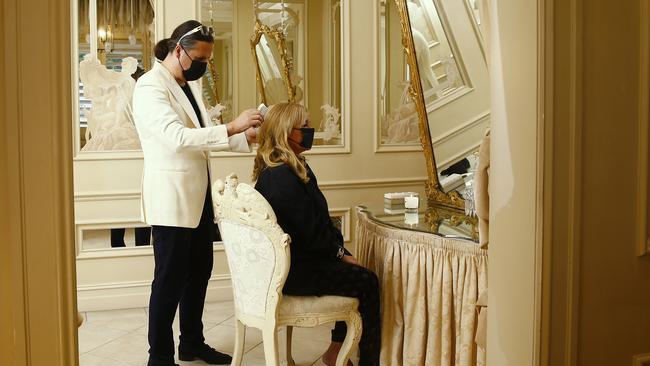
“Many people have mentioned they don’t feel comfortable visiting busy, enclosed salons and malls since lockdown restrictions eased,” he says.
“It has definitely been an overwhelming time and my days have extended to meet the demand.”
Prices for a gloss colour start at $132 and for that you get your own suite and Giavis attending to your hair throughout the entire appointment.
“Colour is a long-haul experience. You need to spend time on it and clients like that I’m the one doing it rather than having five people touch their hair,” he says.
“The one-on-one model has always been a part of what I do and now it just feels more desirable than ever before. My salon is not a conveyor belt.
“I do believe Covid has changed how we interact with each other. There is a certain amount of anxiety about being too close to others. Many clients have mentioned they don’t feel comfortable visiting big malls since restrictions eased and are doing more strip shopping. I’ve also noticed more people shopping along Queen St.”
One of Giavis’ long-term clients, former fashion designer Charlie Brown, likes that the salon is quiet and she receives Giavis’ undivided attention.
“In regards to Covid, I’m aware that the world is getting back to normal very quickly but it does make me feel safer when I have to sit somewhere for hours at a time that I have my own space,” she says.
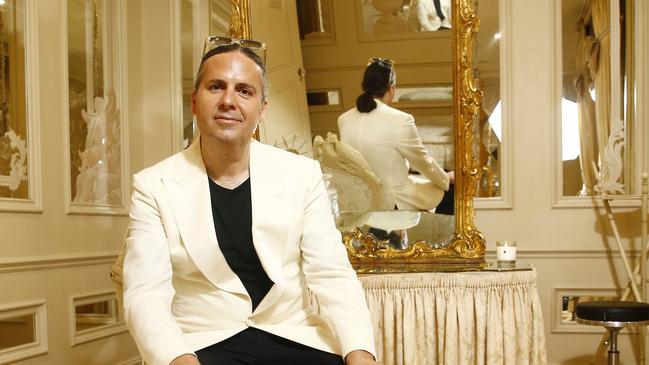
“I feel very, very safe when I’m sitting here for four hours getting my colour done. It’s like you’re in your own world.”
While Brown feels safe in the salon, the same can’t be said for shopping centres.
“I prefer to get in and out, I’m not browsing. I’m going in for something that I want and if I can’t find it, I’m out,” she says.
“Maybe Covid has shown us what you need and the things you don’t really need in life anymore. I don’t miss shopping, I really don’t.”
Personal fashion stylist Caitlin Stewart believes a lot of people feel the same as Brown. Since lockdown ended, she’s had a number of clients send her to shopping centres on their behalf because they don’t want to be out browsing.
“I think people are still scared of going out into public spaces. I went into the city the other day to shop and it was a ghost town,” Stewart says.
“When we do go shopping, clients don’t want to spend a full day in there. They want me to go in beforehand and put outfits aside on a rack. Pre-Covid, it would be half a day shopping together, now it’s two hours in and out.”
Stewart doesn’t know if we’ll go back to browsing stores. At the moment people are hesitant but they may slowly become more confident mingling in large crowds.
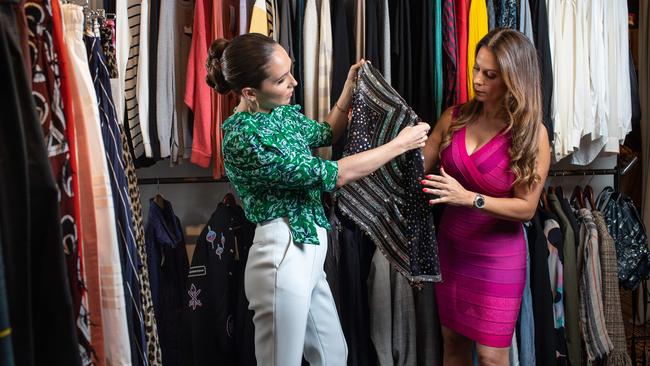
“It is sad, there was something really lovely about that foot-to-pavement shopping experience – people made a day of it – but it won’t be the same for a while. I really hope we can get back to that exciting buzz of being back in the shops, especially on a Saturday morning heading into big shopping centres. At the moment there’s no buzz, it’s still very early days and the energy is not there,” she says.
The average price for a half-day’s personal styling ranges from $300-$600 and Stewart believes clients are happy to spend that because of the efficiency.
“Lockdown has meant people are so used to doing things online now and they’ve realised it saves time. This is a luxury service, but people with more discretionary income want these private services,” she says.
“Traditionally, a client would come on a shopping trip but we were doing it all online during lockdown. Now that they have to go back into the office, they don’t want to spend time shopping, they want to outsource.
“The real test is when people go back to the office full-time. Working from home means people are used to having more time for things that they missed out on before, such as exercise, cooking and time with their children. It was a slower pace of life.
“When it comes to outsourcing, that’s where one-on-one service-based businesses will come in. People will be prepared to pay for these luxuries, not only to provide them with space and personal service, but to really maximise their time.”
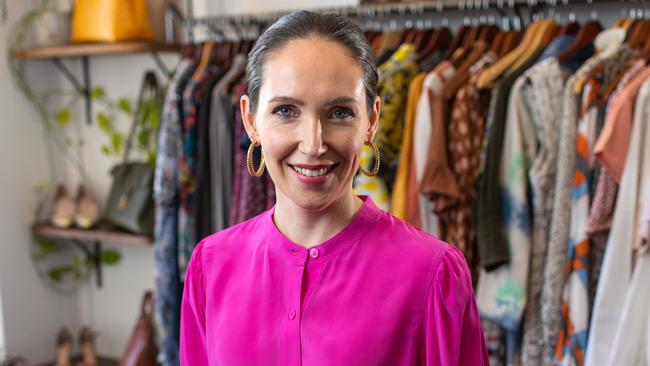
Social researcher Claire Madden believes lengthy lockdowns have changed how we consume and how we think about retail as well as personal services.
“Lockdowns have been extended to such a duration that it has pushed even late adopters to consider online shopping. I think once people discover the time-saving nature of it, it changes things. It’s not only the risk of being exposed to Covid, but also the convenience of products arriving at the front door,” she says.
We have been living with Covid for almost two years, which Madden says is long enough to change habits.
“It will be interesting to see how we adapt as things open up again, if we go back to our normal way of mixing in large crowds or being wary of socially packed places,” she says.
“We’ve become more educated about how viruses spread on surfaces touched by others such as gym equipment that people have used and left sweat on. We know the risks of being in small confined spaces with other people and the importance of washing your hands and social distancing.
“I think it is an opportunity for businesses to consider the way they’re operating – how they are providing services – and make it not only safe, but attractive to the consumer who is far more aware of wanting personal space.”
Adala Bolto, founder and director of Zadi Training, believes people are making the switch from the big chain gyms to boutique studios because they don’t want to train shoulder-to-shoulder and increase the risk of catching Covid.
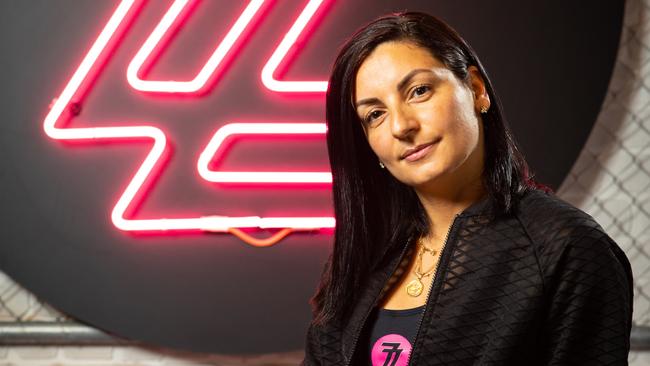
The benefit of small studios is lower numbers and more space while being more affordable than personal trainers. Unlimited classes at Zadi are $69 a week, which is less than the cost of one personal training session.
“We specialise in small classes – there is a maximum of 18 people – so it’s not overcrowded and you get personalised attention,” Bolto says.
While social distancing is in place, Bolto believes socialisation is also important. It’s about striking a balance.
“People want an experience, not just a gym visit. Zadi is a premium environment that focuses on community,” she says.
“We already had low class numbers and tweaked it so that everybody has their own personal station throughout the workout so they’re not sharing weights, but they are still working out together.”
Even through the highly contagious Omicron strain, numbers stayed high.
“I was really surprised. Attendance dropped but it was significantly better than expected and we didn’t have to cancel classes,” Bolto says.
“We’ve always had small ratios in class and exercise stations with more space, which falls in with Covid-safe guidelines, and took extra care with hygiene. Covid or not, we’ve always believed in members having personal space.”
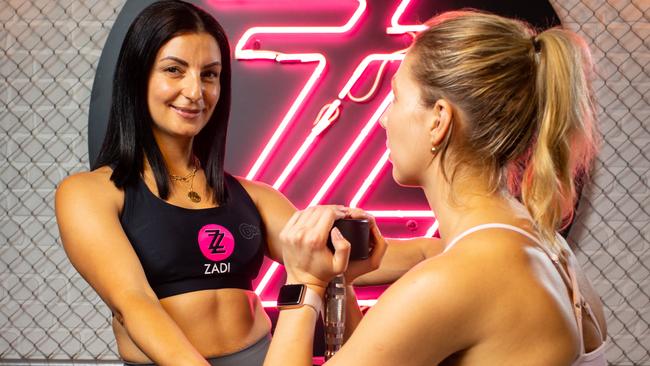
Unfortunately, Bolto caught Covid and 80 per cent of her staff needed time off because they also tested positive or were close contacts.
“It’s similar to hospitality – any service industry where you rely on people to provide a service will be affected,” she says.
“It’s hard as a business, but our systems and processes are very simple so it’s easier when we’re running low on staff. Our programs are planned in advance, filmed, recorded and up on a screen, so it doesn’t require hands-on work from the trainer. They just come in and deliver it.
“The old-school fitness industry doesn’t operate like that, but it’s the way of the future.”

